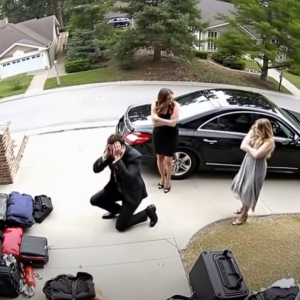I always paid when dining with my mom. Then one day she invited me out—four of her friends were already there. She smiled, “You’ve got this, right?” I paid. Later, I said it wasn’t okay. So next time, I booked a table for one. When they arrived, I…
…stood up, kissed her on the cheek, and said, “I’ll catch up later—this one’s just for me.”
They all stared like I’d pulled a fire alarm in the middle of brunch. My mom blinked, almost laughed, then did this weird tight-lipped nod and took the booth next to mine with her little entourage. I could feel them whispering, but I kept my eyes on my omelet like it was a matter of national security.
Here’s the thing—I love my mom. I really do. But at some point, it stopped feeling like I was being a good daughter and started feeling like I was being played. For months, she’d been inviting me out “just the two of us,” and every single time, there’d be someone else tagging along. Her friend Nalini. Then a cousin visiting from Durban. Then her friend’s son who “might be a good match” for me. I never made a fuss. I paid the bill. Every. Single. Time.
But that lunch with the four friends—that was a new level. It was like I’d been set up.
I’m not loaded. I’m a freelance graphic designer with two retainer clients, a mountain of student debt, and a car that sounds like a coughing goat in winter. I don’t mind paying for my mom occasionally—it felt like a small thank-you for all the sacrifices she made raising me alone. But at some point, I realized she’d started to expect it. And worse, she was parading me around like some kind of ATM with lipstick.
So when I pulled that “table for one” move, it wasn’t just pettiness. It was a soft boundary with sharp edges.
A week later, she called me.
“Beta,” she started, drawing out the word the way she does when she’s unsure of my mood. “You humiliated me in front of my friends.”
I took a breath. “You humiliated me by springing five people on me and expecting me to foot the bill without even asking.”
She paused, then shifted to wounded mode. “I thought you liked treating your mother. You used to say, ‘One day I’ll repay you for everything.’”
“Yeah,” I said, “but I didn’t mean like this. I meant with dignity. Not like… being used.”
She didn’t like that word. She hung up.
We didn’t speak for three weeks.
I was mostly okay with the silence. I told myself we needed the space. But I won’t lie—some days, I’d find myself staring at the phone, thinking about calling, then not. There’s a kind of guilt that sits in your chest like a lodged seed. No matter how justified you feel, it still grows.
Then came the wedding.
Not mine. My cousin Nirel was getting married in Goa. Everyone in the family was flying out. I almost didn’t go, but my aunt guilted me into it. “Family’s family,” she said, “and you two need to sort your stuff.”
So I went.
My mom arrived late the first night, wearing this royal blue sari with gold trim and a matching clutch I’d never seen before. Her friends circled her like satellites. I felt like a distant planet.
We didn’t speak at the welcome dinner. Not a word. She danced with cousins, laughed loudly, and somehow avoided me like a pro. I kept sipping my lime soda and nodding politely at the older aunties asking me why I was still single. Same old circus.
But on the second night—during the mehendi function—something shifted.
I was helping Nirel’s mom set up the gift table when I overheard two women talking near the buffet.
“She’s getting cheeky now,” one said. “Even took her own daughter off the hook. Poor girl used to pay for everything.”
“Are you serious?” the other one said. “Kamala always made it sound like she was doing her daughter a favor. Said it was how she taught her to be generous.”
My ears went hot. I turned and saw them—two of my mom’s friends from that infamous lunch. Laughing over jalebi.
That’s when I realized… my mom wasn’t just expecting me to pay—she was bragging about it. As if it made her more modern, more progressive. Like she’d raised a daughter so successful, she could foot bills like a banker.
It stung. Not because I minded being generous—but because it was never framed that way. It was entitlement disguised as pride.
Later that night, after the sangeet performances, I found her sitting alone near the pool.
“You look tired,” I said.
She blinked up at me. “You look happy.”
“I heard your friends talking,” I said. “About me. About the bills.”
She looked away, her jaw tight.
“You made it sound like I enjoyed being treated like a walking wallet.”
“I didn’t say that,” she muttered.
“You didn’t not say it,” I said.
For a second, her whole face crumbled. “You don’t understand. They always brag about their sons. How they send money home, buy appliances, fund trips. I just… I wanted to show them I had something too.”
That landed.
Suddenly, it wasn’t about the money. It was about status. Pride. That old immigrant ache of not wanting to feel left behind. Of needing to win somehow, even if just in conversation.
“I’m not your trophy,” I said gently.
She nodded. “I know. I know. I just… didn’t realize I was embarrassing you.”
We didn’t hug. That’s not our style. But she reached over and adjusted the edge of my dupatta, like she used to when I was little. I let her.
The next morning, something wild happened.
At breakfast, she stood up in front of her four friends and said, “This one’s on me.”
They all blinked. One tried to protest.
“I insist,” she said, with a smile I hadn’t seen in a long time.
It was her way of apologizing.
After the wedding, things changed.
She still invited me to lunch. But now she’d call in advance, tell me who was coming, and say, “My treat this time. Or we split?”
Sometimes I’d pay, sometimes she would. Once, one of her friends tried to joke, “Oh, are we doing the daughter credit card again?” and my mom shut it down with a look that could burn toast.
But the real twist came a few months later.
She started a baking class.
My mom, the woman who once burned toast in a toaster, started making pistachio rose cakes and lemon cardamom biscotti. Turns out she had a knack for it.
Then she started selling them in the community WhatsApp groups. Orders flooded in.
Within three months, she was making enough to open a stall at the Saturday market.
Guess who paid for her permit? I did. Happily.
At her first stall, someone asked, “Are you the daughter who always picks up the check?”
My mom laughed and said, “Not anymore. Now she just picks up the empty trays.”
I don’t know what flipped the switch. Maybe it was being seen. Or heard. Or just that small crack in the wall we both built. But somehow, we got through.
Now when we go out, we still bicker over the bill. But it’s light, playful. Not loaded.
And every so often, she’ll nudge me and say, “Beta, thank you. For the patience. For the wake-up call. For not ghosting your old mother.”
And I’ll say, “Thank you. For the biscotti discount.”
If I’ve learned anything, it’s this—money’s not the enemy. Silence is. The longer you avoid the real conversations, the heavier the weight becomes. Pride, hurt, ego—it all festers in the quiet.
But one real talk, one awkward but honest moment? It can reset everything.
So if someone’s treating your kindness like a transaction, speak up. Not with anger. With clarity.
You never know—the person you’re confronting might just be waiting for permission to grow.
Thanks for reading—if this hit home, give it a like or share it with someone who needs a gentle nudge.





